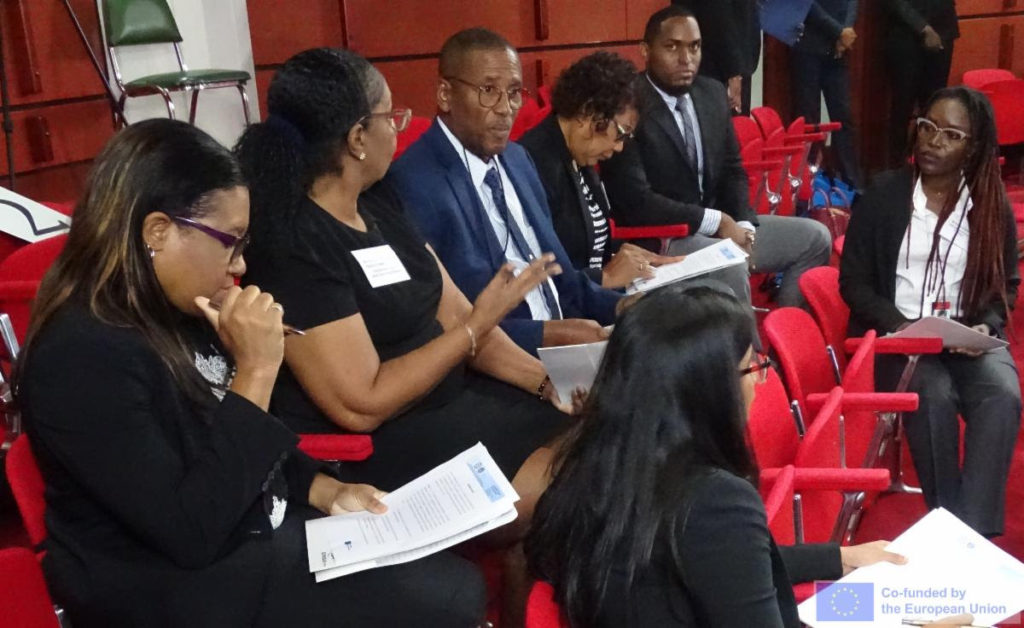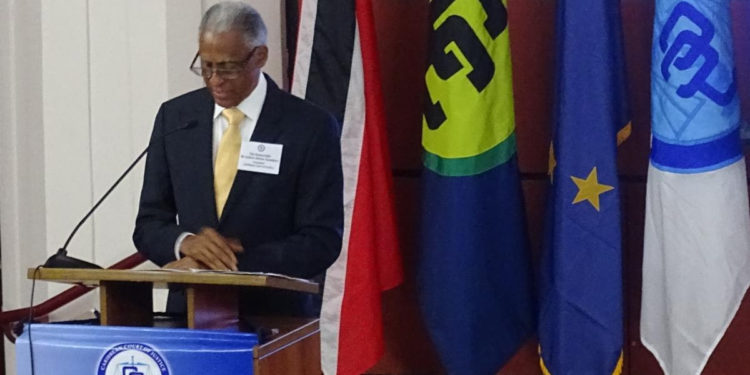Port of Spain, Trinidad and Tobago. On 18 May 2023, the Chief Justice, judicial officers of the Judiciary of Trinidad and Tobago, members of specialised courts and tribunals and other jurists joined the President and judges of the Caribbean Court of Justice (CCJ) for a judicial sensitisation workshop on the CCJ’s referral process. This activity, which took place at the Hall of Justice in Port of Spain, Trinidad, is part of a series of workshops being conducted regionally by the CCJ to improve knowledge of the CCJ’s Original Jurisdiction. Executed with financial support from the European Union’s 11th European Development Fund, this workshop focused on increasing awareness of the national courts’ duty to refer questions concerning the interpretation of the Revised Treaty of Chaguaramas (RTC) and issues under the Caribbean Single Market and Economy (CSME) to the CCJ for determination in its Original Jurisdiction. The session comprised discussions and a group simulation exercise designed that allowed participants to determine what measures should a domestic court adopt when faced with a question of the application of the RTC. The half-day session was facilitated by CCJ Judges Justices Winston Anderson and Jacob Wit and Dr Chantal Ononaiwu, Director of External Trade at the CARICOM Secretariat.
In her welcome remarks at the official opening, Justice Gillian Lucky, Justice of Appeal of Trinidad and Tobago and Chairperson of the Judicial Education Institute of Trinidad and Tobago acknowledged the role of the regional court in the CSME. She asserted that ‘the CCJ, although not the final Court of Appeal for all Member States (as yet), plays a vital role in ensuring uniformity, consistency, and fairness in the interpretation and application of Caribbean law.’
Hailed as a success by organisers, the Honourable Mr Justice Ivor Archie, Chief Justice of Trinidad and Tobago thanked the CCJ and the European Union for the opportunity to better equip judicial officers. Describing the event as ‘significant’, the Chief Justice noted that this session signalled ‘both the importance of collaboration between the CCJ and the Judiciary, including with regard to judicial education, as well as recognition of the CCJ’s role in our municipal law.’
The CCJ has exclusive and compulsory jurisdiction to interpret and apply the RTC, making it the only court that can rule on matters concerning breaches of the rights granted under the CSME. These rights include the freedom of movement of skills and labour, money, goods and services and the right of establishment. In its Original Jurisdiction all CARICOM Members States with the exception of The Bahamas, Haiti and Montserrat can bring matters before the Court. As such, in the past, the CCJ has heard matters from Dominica, Guyana, Jamaica, Saint Lucia, Suriname and Trinidad and Tobago.
In his address at the formal opening of the workshop, CCJ President, the Honourable Mr Justice Adrian Saunders emphasised the importance of the workshop being conducted in Trinidad and Tobago. He remarked ‘Trinidad and Tobago’s huge stake in the CSME arrangements has naturally translated to relatively high activity in litigation before the CCJ in our Original Jurisdiction. The CCJ has rendered 37 decisions in that jurisdiction. Not surprisingly, of these 37, as many as 23, that is approximately 62%, have involved, whether as Claimant or Defendant, either the State of Trinidad and Tobago or a company incorporated or registered here. The first case heard in the Original Jurisdiction was brought by a company incorporated in Trinidad and Tobago.’ Lamenting the lack of referrals originating from domestic courts, President Saunders suggested that this might be the result of the lack of familiarity with the referral process and the inexperience of the legal profession in this area of the law. He explained that the aim of the workshop was to remedy this situation for the benefit of future litigants.
His Excellency Peter Cavendish, Ambassador of the European Union to Trinidad and Tobago, explained that judicial cooperation remains a key pillar of the European Union’s activities in the Caribbean and that this ‘workshop falls under the EU’s Support to the Caribbean Court of Justice programme. The project aims at improving access and delivery of justice in the Caribbean region, by strengthening the functions and outreach of the CCJ supporting the establishment and operationalisation of the Caribbean Community Administrative Tribunal (CCAT), and enhancing legal education in the Caribbean’. The CCJ will also benefit from an additional 1.26 million EUR contribution from the EU. These funds will be used to procure IT equipment, as well as to enable the Council of Legal Education’s curriculum reform efforts for the region’s law schools.’
It is anticipated that the next workshop with judicial officers and the bar association will be held in June when the Court sits in Guyana.












